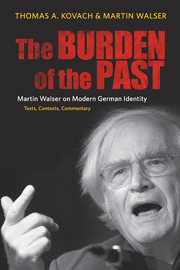Book contents
- Frontmatter
- Contents
- Acknowledgments
- The Burden of the Past
- Introduction
- Our Auschwitz (1965)
- No End to Auschwitz (1979)
- Handshake with Ghosts (1979)
- Speaking of Germany (A Report) (1988)
- Experiences while Composing a Sunday Speech: The Peace Prize Speech (1998)
- On Talking to Yourself: A Flagrant Attempt (2000)
- Conclusion
- Suggestions for Further Reading
- Index
Experiences while Composing a Sunday Speech: The Peace Prize Speech (1998)
Published online by Cambridge University Press: 05 February 2013
- Frontmatter
- Contents
- Acknowledgments
- The Burden of the Past
- Introduction
- Our Auschwitz (1965)
- No End to Auschwitz (1979)
- Handshake with Ghosts (1979)
- Speaking of Germany (A Report) (1988)
- Experiences while Composing a Sunday Speech: The Peace Prize Speech (1998)
- On Talking to Yourself: A Flagrant Attempt (2000)
- Conclusion
- Suggestions for Further Reading
- Index
Summary
Context
AS IS NOW WELL KNOWN, what seemed a pipe dream at the time of Walser's 1988 speech — the idea of overcoming the division of Germany — was to become a reality within months afterward. In the same year, the East German government felt so threatened by Gorbachev's liberalizing tendencies that it actually forbade the distribution of some Soviet publications it regarded as subversive. In the summer of 1989, the reformist Hungarian regime opened its border with Austria, thus creating a route to the West for citizens of East Germany. East Germans looking to escape also sought asylum in the West German embassies in Czechoslovakia and Poland. In September, West German foreign minister Genscher granted them permission to enter West Germany. Demonstrators in the streets of Leipzig and other East German cities demanded radical reforms, under the slogan “Wir sind das Volk” (We are the people). In a decisive turn, this demand for self-determination, with the change of one word, became a demand for unification: “Wir sind ein Volk” (We are one people). On November 9, a weakened East German government opened the Berlin wall, leading to a celebration by Berliners on both sides of the Wall. A week later, East Germany's hard-line chancellor Krenz was replaced by the reformist Hans Modrow, who promised free elections. When these elections took place in March 1990, the East German ruling party, the SED (Sozialistische Einheitspartei, or Socialist Unity Party), which had renamed itself the PDS (Partei des Demokratischen Sozialismus, or Party of Democratic Socialism), was trounced by the East German branch of the CDU (Christlich-Demokratische Union, or Christian-Democratic Union), the ruling party in West Germany.
- Type
- Chapter
- Information
- The Burden of the PastMartin Walser on Modern German Identity: Texts, Contexts, Commentary, pp. 81 - 106Publisher: Boydell & BrewerPrint publication year: 2008



